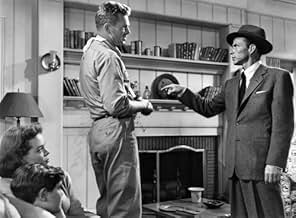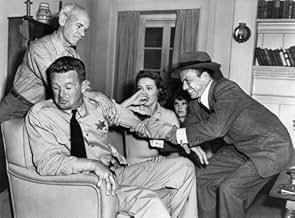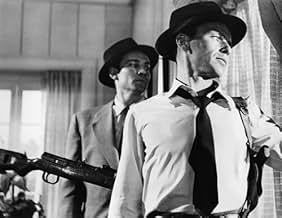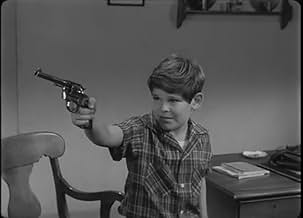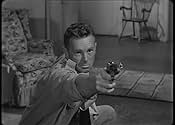Ajouter une intrigue dans votre langueIn the city of Suddenly, three gangsters trap the Benson family in their own house, on the top of a hill nearby the railroad station, with the intention of killing the president of the USA.In the city of Suddenly, three gangsters trap the Benson family in their own house, on the top of a hill nearby the railroad station, with the intention of killing the president of the USA.In the city of Suddenly, three gangsters trap the Benson family in their own house, on the top of a hill nearby the railroad station, with the intention of killing the president of the USA.
- Réalisation
- Scénario
- Casting principal
James O'Hara
- Jud Hobson
- (as James Lilburn)
John Beradino
- Trooper
- (non crédité)
Richard Collier
- Ed Hawkins
- (non crédité)
Roy Engel
- Driver Asking Slim for Directions
- (non crédité)
Hans Moebus
- Schultz
- (non crédité)
Ted Stanhope
- Driver Asking Tod for Directions
- (non crédité)
Avis à la une
I'm at a loss to explain why Frank Sinatra chose this particular project in the wake of all the acclaim he got for From Here to Eternity. Without his presence in the film, Suddenly with its length of 75 minutes on my VHS version would be a B film, even with Sterling Hayden starring in it as the sheriff. My guess is that Sinatra wanted to expand and test himself as an actor, something he did less and less of in the following decade.
The President of the United States is coming to the small town of Suddenly where he will leave the train he's traveling on and proceed by motorcade to a vacation in the Sierras. The Secret Service has come to town to do their usual thing in protecting the Chief Executive.
But three contract killers headed by Frank Sinatra are in town to kill the president. We're never told exactly who is paying for this contract, but the inference is that it is our Cold War enemies. Through a combination of circumstances the sheriff is wounded and the head of Secret Service detail, Willis Bouchey, is killed. And the killers are holed up in Nancy Gates's house with her, her father-in-law James Gleason, and child Kim Charney and the wounded Hayden.
Most of the film is taken up with the wait for the train to arrive where a lot of souls are bared open, including Sinatra's. It's the one and only time that Francis Albert ever essayed the role of an out and out villain. He does it well, but I suspect he didn't want to push it with his public too much, so he never did anyone as evil as this again.
Of course history tells us that the president named Eisenhower at the time never was an assassin's target so we know Sinatra's efforts will fail. However it's rather ingenious as to how it does fail.
I think more than fans of old Blue Eyes will like Suddenly.
The President of the United States is coming to the small town of Suddenly where he will leave the train he's traveling on and proceed by motorcade to a vacation in the Sierras. The Secret Service has come to town to do their usual thing in protecting the Chief Executive.
But three contract killers headed by Frank Sinatra are in town to kill the president. We're never told exactly who is paying for this contract, but the inference is that it is our Cold War enemies. Through a combination of circumstances the sheriff is wounded and the head of Secret Service detail, Willis Bouchey, is killed. And the killers are holed up in Nancy Gates's house with her, her father-in-law James Gleason, and child Kim Charney and the wounded Hayden.
Most of the film is taken up with the wait for the train to arrive where a lot of souls are bared open, including Sinatra's. It's the one and only time that Francis Albert ever essayed the role of an out and out villain. He does it well, but I suspect he didn't want to push it with his public too much, so he never did anyone as evil as this again.
Of course history tells us that the president named Eisenhower at the time never was an assassin's target so we know Sinatra's efforts will fail. However it's rather ingenious as to how it does fail.
I think more than fans of old Blue Eyes will like Suddenly.
When the President decides to pass through the small town of Suddenly on route to a fishing trip, the town's police and chief officials rise to meet the challenge of assuring his protection as there have been rumors of an assassination attempt.
The hired guns meanwhile make plans of their own. They cleverly trick their way into the home of the best house in town from which to try and carry out their assassination plot - the house of Pop Benson, respected citizen with an house upon an hill that overlooks the President's planned arrival destination. Now only an handful of hostages stand between the President and doom...can they in some way warn him in time?
Frank Sinatra steals the show here as the ruthless criminal mastermind behind the want-to-be assassins - a man named John Baron. He is downright brutal and nasty in the role--an utterly detestable villain who does remind us the it was the army that created him and made him into a killer or maybe deep down, it's just that he was always a killer at heart. An outstanding multi-dimensional performance from Sinatra.
Sterling Hayden meanwhile plays the idealistic police sheriff Tod Shaw, who believes in America and the American way and supports unquestioningly the system and will do whatever it takes to preserve the America he believes is right and just. He too served in the military to protect rights and freedoms and now carries on the good fight as Suddenly's sheriff. An interesting contrast of two extremes with the pacifist minded Ellen Benson (played here by Nancy Gates), her becoming a widow after her husband got killed in the war, finally forced to take a stand at the film's climax.
Daring for its time, this film deals with surprisingly intense subject matter for the early 1950s. Quite good.
The hired guns meanwhile make plans of their own. They cleverly trick their way into the home of the best house in town from which to try and carry out their assassination plot - the house of Pop Benson, respected citizen with an house upon an hill that overlooks the President's planned arrival destination. Now only an handful of hostages stand between the President and doom...can they in some way warn him in time?
Frank Sinatra steals the show here as the ruthless criminal mastermind behind the want-to-be assassins - a man named John Baron. He is downright brutal and nasty in the role--an utterly detestable villain who does remind us the it was the army that created him and made him into a killer or maybe deep down, it's just that he was always a killer at heart. An outstanding multi-dimensional performance from Sinatra.
Sterling Hayden meanwhile plays the idealistic police sheriff Tod Shaw, who believes in America and the American way and supports unquestioningly the system and will do whatever it takes to preserve the America he believes is right and just. He too served in the military to protect rights and freedoms and now carries on the good fight as Suddenly's sheriff. An interesting contrast of two extremes with the pacifist minded Ellen Benson (played here by Nancy Gates), her becoming a widow after her husband got killed in the war, finally forced to take a stand at the film's climax.
Daring for its time, this film deals with surprisingly intense subject matter for the early 1950s. Quite good.
Frank Sinatra was certainly one of the greatest singers of our time. He was also a fine actor as well, he won an Academy Award for From Here To Eternity. This was the first film he was in after he won his Oscar and he proves it was not a fluke. He is absolutely chilling as a crazed cold blooded assassin who is out to kill the President. The only other actor who did a better job in this type of role is John Malkovich in In The Line Of Fire. This is a little known classic that really showcases Sinatra's acting talents. I think that this film and The Manchurian Candidate are the best films he ever made.
This tense, relatively well-crafted little thriller dispenses with frills or padding, and tells its story in a straightforward way that works pretty well. Once it sets up the story, it maintains the tension carefully enough to make up for some plot holes and one-dimensional characters.
The focus remains almost entirely on the story, and the characters are never developed very deeply. The three main roles are rather well-cast, though, and Frank Sinatra, Sterling Hayden, and James Gleason each deliver what their roles call for.
Although implausible at some points, the story is otherwise well-constructed, and it moves at a good pace. Many film-makers are tempted to inject superfluous material into this kind of story, and this is an example showing that it usually works better to keep it simple. While nothing extraordinary, it works more than well enough to be worth watching.
The focus remains almost entirely on the story, and the characters are never developed very deeply. The three main roles are rather well-cast, though, and Frank Sinatra, Sterling Hayden, and James Gleason each deliver what their roles call for.
Although implausible at some points, the story is otherwise well-constructed, and it moves at a good pace. Many film-makers are tempted to inject superfluous material into this kind of story, and this is an example showing that it usually works better to keep it simple. While nothing extraordinary, it works more than well enough to be worth watching.
The movie kicked up something of a fuss at the time (1954). After all, Ike Eisenhower was not only a popular president but a war hero as well. It's probably no stretch to say that, yes indeed, everybody liked Ike. So this was a pretty nervy production for the conformist 1950's. Then too, it's likely no accident that the movie was produced independently of the Hollywood studios. I doubt any studio, big or little, would have okay'ed such touchy subject matter as killing a president. But the 70 minutes does amount to an effective little suspenser, as assassins and hostages crowd into a living room perch awaiting the president's sitting-duck arrival, while the tension mounts.
The movie came along during a low point of Sinatra's career before his 1954 Oscar reversed the slump. That's probably one reason he would take on such a risky role as the thoroughly dis-likable assassin. And visually, especially, Sinatra's's quite good. As a result, when Baron says he would be nothing without his gun, Sinatra's scrawny non-Hollywood appearance confirms the fact. Just as importantly, he gives the would-be assassin the right kind of nervous edge.
There's a fairly obvious theme working through the screenplay— namely that despite pacifist wishes, violence does have a moral place in life. As events in the movie turn out, the only way to stop Baron's immoral use of violence is with morally sanctioned counter-violence. The screenplay makes the point by showing us that had Pidge gone along with Mom's anti-gun wishes, the assassination plot would have succeeded. So fortunately-- the movie implies-- when push comes to shove, Pidge follows the men in his life and the plot fails.
For Cold War audiences of the day, the political lesson is pretty clear—only guns and muscle will stop Soviet plans to destroy "The American Way". Of course, the film never identifies the authors of the plot, but I'm sure audiences came to the obvious political conclusion. It's probably also telling that guns are identified with manly men and only a frightened woman, the mother, opposes them. Mom's doubts may be understandable given her husband's violent death. However, by ignoring Mom's wishes, no matter how understandable, Pidge comes to represent a future in which gun violence and armed national defense will continue to be morally necessary. Beneath the surface, it appears, lies some pretty heavy symbolism.
Subtexts aside, Suddenly remains a gripping film even this many years later. That's pretty darn good for a cheap production using basically one set for most of the action. But, I expect it's really the touchy subject matter that continues to excite viewers and separate the film from more routine suspensers of the day.
The movie came along during a low point of Sinatra's career before his 1954 Oscar reversed the slump. That's probably one reason he would take on such a risky role as the thoroughly dis-likable assassin. And visually, especially, Sinatra's's quite good. As a result, when Baron says he would be nothing without his gun, Sinatra's scrawny non-Hollywood appearance confirms the fact. Just as importantly, he gives the would-be assassin the right kind of nervous edge.
There's a fairly obvious theme working through the screenplay— namely that despite pacifist wishes, violence does have a moral place in life. As events in the movie turn out, the only way to stop Baron's immoral use of violence is with morally sanctioned counter-violence. The screenplay makes the point by showing us that had Pidge gone along with Mom's anti-gun wishes, the assassination plot would have succeeded. So fortunately-- the movie implies-- when push comes to shove, Pidge follows the men in his life and the plot fails.
For Cold War audiences of the day, the political lesson is pretty clear—only guns and muscle will stop Soviet plans to destroy "The American Way". Of course, the film never identifies the authors of the plot, but I'm sure audiences came to the obvious political conclusion. It's probably also telling that guns are identified with manly men and only a frightened woman, the mother, opposes them. Mom's doubts may be understandable given her husband's violent death. However, by ignoring Mom's wishes, no matter how understandable, Pidge comes to represent a future in which gun violence and armed national defense will continue to be morally necessary. Beneath the surface, it appears, lies some pretty heavy symbolism.
Subtexts aside, Suddenly remains a gripping film even this many years later. That's pretty darn good for a cheap production using basically one set for most of the action. But, I expect it's really the touchy subject matter that continues to excite viewers and separate the film from more routine suspensers of the day.
Le saviez-vous
- AnecdotesMontgomery Clift turned down the lead role.
- GaffesWith the rifle locked in place, the chance of the President being exactly in line of fire is slim to none.
- Citations
John Baron: I'm not actor, bustin' my leg on a stage so I can yell 'down with the tyrants'. If Booth wasn't such a ham he might've made it.
- Versions alternativesAlso available in a computer colorized version.
- ConnexionsEdited into Your Afternoon Movie: Suddenly (2022)
Meilleurs choix
Connectez-vous pour évaluer et suivre la liste de favoris afin de recevoir des recommandations personnalisées
- How long is Suddenly?Alimenté par Alexa
Détails
Box-office
- Montant brut aux États-Unis et au Canada
- 1 400 000 $US
- Durée
- 1h 17min(77 min)
- Couleur
- Rapport de forme
- 1.75 : 1
Contribuer à cette page
Suggérer une modification ou ajouter du contenu manquant


